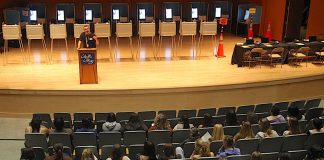There are moments in a community’s life when silence is not neutral. It is a decision.
This is one of those moments in Pajaro Valley Unified School District.
Our Board of Trustees is preparing to approve revisions to Policy 6144 – the so-called “Controversial Issues” policy. The language sounds harmless, even reasonable: teachers should be “neutral,” administrators may decide what is “appropriate,” and the classroom should stay clear of controversy. But beneath those words lives something older and far more dangerous – fear disguised as order.
We have been teachers long enough to know what happens when fear begins to write the lesson plan.
It starts quietly.
A student asks why the strawberry fields beside their school are sprayed while children play nearby.
Another wants to talk about the rent crisis, forcing families into motels.
A senior writes a speech about farmworkers’ rights, and the teacher wonders if that’s “too political.”
An Ethnic Studies class reads a book about queer identity, and someone demands a warning label.
Soon, the classroom, that small miracle of democracy, becomes a place where courage is replaced by caution. Where students learn that truth must ask permission before it speaks.
The proposed policy gives the Superintendent or designee unchecked power to determine what can be said, what can be taught, and who may speak to our students. It demands that teachers “consult” before addressing controversial topics. It allows the district to forbid us from sharing even a personal viewpoint. It tells us, in effect, that our judgment – the very thing that makes us professionals – cannot be trusted.
That is not neutrality. That is censorship dressed in administrative clothing.
If this policy passes, a teacher could need permission to discuss climate change, immigration, policing, or labor rights.
A science teacher might think twice before inviting an environmental health expert.
An English teacher might skip a book with queer or trans characters rather than risk complaint.
And a civics teacher might teach civic silence instead of civic voice.
The district may claim these revisions bring “balance.” But there is nothing balanced about fear.
California law already protects students from bias. It already requires teachers to present issues factually and with respect. What this policy adds is control: the power of a superintendent’s office to decide which truths are safe enough for children to hear.
Worse, the revisions misstate the law. They claim that parents can opt their children out of “LGBTQ+ content,” as if inclusion were a threat. But the FAIR Education Act requires exactly that inclusion – the accurate portrayal of LGBTQ+ people, people with disabilities, and communities of color in our history and curriculum. There is no opt-out for equality.
Combining LGBTQ+ lessons with sexual-health opt-outs is not a small mistake; it is a return to an old pattern. It is the same logic once used to keep books about Black life off shelves, to erase labor struggles from textbooks, to declare that certain truths were “too controversial” for the classroom.
Each generation rediscovers this temptation: to protect children not from harm, but from honesty.
The irony is that PVUSD teachers have always modeled what democracy requires — not agreement, but dialogue. We teach students to weigh evidence, to listen to perspectives that unsettle them, to separate fact from falsehood. In doing so, we help them become citizens, not subjects.
To silence that work is to betray the very mission of public education.
James Baldwin once wrote, “The purpose of education is to create in a person the ability to look at the world for himself, to make his own decisions.”
He warned that such independence is dangerous to those who need obedience more than truth.
We are living his warning now.
If the board approves these changes, they will not protect our students; they will only protect the district from discomfort. They will turn teachers into clerks of permission slips. And they will teach our children a lesson they will never unlearn – that the safest thing to do with truth is to hide it.
We ask our trustees to reject these revisions and to stand instead for academic freedom, teacher professionalism, and honest education. Let our classrooms remain places where students learn to speak, to question, and to think; not places where silence becomes school policy.
Because if we teach fear, we will inherit it.
If we teach freedom, we just might save ourselves.










I am trying to understand the argument is here, but I admit I am struggling. Are teachers asking to be given carte blanche to say anything they want in the classroom? Why would that be a good thing? Should a teacher tell students to support a particular candidate for school board based on their beliefs? Should a teacher be telling their students how Trump is doing a great job and should be president forever?
When a teacher is asked something that they are not a subject expert on, maybe they could just state that they don’t know enough about a topic to explain it to a student. Our teachers are paid government employees. They are expected to teach exactly what the state and county are paying them to teach. If a topic is in their standards, they should talk about it, otherwise, maybe they should avoid imposing their bias on their students.
Policy 6144 as described above seems like a legal maneuver to protect PVUSD from lawsuits caused by teachers forcing their personal agendas on their students who are required by law to sit in their classrooms. It does not seem nefarious, it looks like a good policy.
Yep pretty much that’s exactly what teachers want. To educate children on topics that they themselves are not specialist at and to voice their opinions on these topics. I can guarantee you if the students wants to voice an opinion completely separate and opposite from that of the teacher that’s not going to be tolerated. They are here to teach topics not to voice their opinions about how things should be, on the students.
It requires permission for teachers to use any controversial issues in their lessons. When studying literature and history actually require the discussion of controversial issues. Our standards actually require us to teach students to form their own opinions and arguments about issues and support their thinking with facts. The banning of controversial issues would harm our students and their development as free and critical thinkers . It is an affront to democracy.
I appreciate your attempt to clarify, Kathleen, but your explanation does not hold water. California Social Studies standards are a list of subjects to be discussed. All of those subjects cannot be controversial subjects, because they are the state standards. If a teacher is trying to bring up other topics (that are not included in the standards) in class, then the district should understand why they are deviating from the curriculum. There is no need for our teachers to preach their own agendas in the classroom. It appears as though you are defending indoctrination under the guise of critical thinking. You know this is not correct. The current standards allow for more than enough room for a skilled teacher to teach include critical thinking. Instead, teachers are asking for permission to preach their own gospel to the children, rather than what the public expects you them to teach. Perhaps if PVUSD teachers viewed themselves as instructors instead of social activists, their student’s reading and math scores wound not be the lowest in the county.
Teachers should paid to teach and not brainwash kids into victimhood. Let the kids have a childhood.
Amen! God Bless Donald Trump and our ICE Agents(for enforcing our immigration laws.)
I never heard any teacher complain when the left tried to stop our parents from letting teachers know what subjects they didn’t want their children to be brainwashed on.